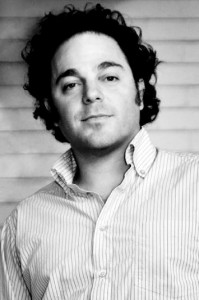 Jacob Paul emerged through light, broad sheets of rain to my office at the back of The King’s English Bookshop clutching a brown paper bag, looking in no way disconcerted by the weather. In my attempt to lure him to interview about his forthcoming novel, I had offered him a couple pints of very good Yorkshire ale. An avid brewer, he arrived with two bottles of his own filled with a deep, stout red beer he had brewed in his cellar. We opened our drinks, and I began to question him about his debut novel, Sarah/Sara.
Jacob Paul emerged through light, broad sheets of rain to my office at the back of The King’s English Bookshop clutching a brown paper bag, looking in no way disconcerted by the weather. In my attempt to lure him to interview about his forthcoming novel, I had offered him a couple pints of very good Yorkshire ale. An avid brewer, he arrived with two bottles of his own filled with a deep, stout red beer he had brewed in his cellar. We opened our drinks, and I began to question him about his debut novel, Sarah/Sara.
A story of the healing that follows an act of terrorism, Sarah/Sara doesn’t open with an apocalyptic vision of passenger planes plunging into the steel and glass of the World Trade Center towers, with a slow motion blossom of flames, or with screaming, although as a firsthand witness and survivor of the day’s events, Jacob Paul knows all the terrible details. The book is not so self-indulgent as a work of fiction and, therefore, avoids anything that even remotely resembles the trite, instead presenting material that is far more delicate, and more meaningful. In its opening pages, the reader finds only refracted echoes of 9/11 shimmering in Sarah’s mind like subdued sound bites, as she kayaks in silence along the Alaskan coastline. Her father, we soon find, was the 9/11 survivor. He did not, however, escape the Jerusalem suicide bomber that has, years later, left Sarah spiritually and physically scarred.
Sarah makes camp, she eats, she drinks, she sleeps and, in the morning, strikes and paddles onward, searching. With a bottle of twelve-year-old scotch tied to the bow like a mascot, the silent, beautiful landscape rolls slowly by, and the book’s protagonist grapples with her identity, her spirituality, and the dark inner voice that consistently reminds her of the ease with which she could disappear completely in the icy waters of the wilderness. Finding no comfort in the past, Sarah pushes into her future, both physically and in the journal she carries. As she paddles, she attempts to invent Sara, the woman she will become.
Sarah/Sara is executed with the deliberate care of a true artisan, and nothing is rushed. Paul’s protagonist forges onward in a new world that has become cold and hostile, and every dip of her paddle in the icy waters of her surroundings, every painful step she takes on frozen, blackened feet, brings her, and us, a little bit closer to the truth that she seeks: how can we find meaning in a world that can lash out at us with no warning, and with such violence?
Conversation
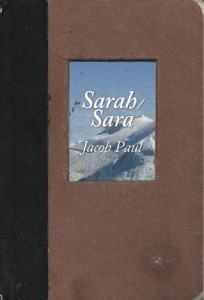 Aaron Cance: You’ve written on your website that books “play out the danger of wedding oneself too strongly to a single reading of a text, readings that make personal and political change impossible to achieve without either reinventing the text or reinventing one’s identity.” The text that Sarah clings to in your novel seems to be her faith, and she struggles to reinvent her identity to reconcile herself with it.
Aaron Cance: You’ve written on your website that books “play out the danger of wedding oneself too strongly to a single reading of a text, readings that make personal and political change impossible to achieve without either reinventing the text or reinventing one’s identity.” The text that Sarah clings to in your novel seems to be her faith, and she struggles to reinvent her identity to reconcile herself with it.
Jacob Paul: Sarah has a couple texts that work this way: Psalms and Job are two that she struggles with. She is trying to find something in the text to interpret her own position in the world. She feels that she has been faithful [to God] in every way, but only continues to be tested. Sarah’s test is the same as Job’s, and the compensation seems to be much the same: the reward for constancy is more trouble.
Is this why she continues to rewrite herself, through the use of her journal?
Sarah’s invention of a future life is something she should have complete control over, yet she even loses control over this imagined destiny. However futile her visualization of the future is, though, it is still essential to surviving what she experiences daily.
I think that any imagined future any of us could create for ourselves is an impossible aspiration, yet we continue to do so. This seems, in and of itself, to be a great act of faith: to imagine a desirable future in order to survive on a daily basis.
I think there’s definitely truth to that. When you try to create this future, however, it always changes on you.
So many aspects of Sarah/Sara hinge on notions of faith and believing. Were there Biblical reasons for Sarah’s changing of her own name at some point in her healing process?
I was originally thinking about it only in the context of a modern day English name and her name in the Hebrew, but there is a whole set of beliefs in the Jewish faith that one’s life force comes from the written name. There is a tradition of changing one’s name as a method of getting oneself out of the book that has been written about you, of changing one’s destiny. Sarah wants to find a new identity that is something she feels she isn’t bound by.
I find it really interesting that in the book of Genesis, it is Jacob who changes his name after wrestling with a manifestation of God. The man tells him that he will no longer be known as Jacob, but will be called Israel because he has “struggled with God and with men and have overcome.” This seems, very much, to parallel Sarah’s own struggles, her own journey. It is very easy to put your faith in a God that we conceive ourselves. A God that exists outside the realm of our own imagination and influence is a force that is far more frightening.
Right. There seems to be the algorithmic God and the unknowable God. The algorithmic God works in a way that is very comprehensible to us. If you’re in trouble, you pray. In return for prayer, your problems are to be resolved and you receive blessings. This God is very much tied into the Protestant ethic where, without any ultimate way of measuring God’s grace, we decided that prosperity was a workable measure. This, however, doesn’t work with the unknowable God. But, without the unknowable God that sometimes acts in ways we can’t possibly comprehend, you can’t define the image of the God that we are all comfortable with. Sarah struggles with these two pieces. Her spiritual struggle is manifested in the story as her inability to reconcile these pieces, and, without their reconciliation she won’t get out of the Arctic.
Aside from the fact that it mirrors the isolation that must, in fact, accompany both her spiritual struggle and her efforts to heal herself in the wake of both of the terrorist attacks she has survived, why did you choose to set the story in the Arctic? Why the Alaskan coastline?
Actually, I’ve always been fascinated with the dangers encountered in the wilderness vs. the dangers of the inner city. The wilderness setting of Sarah/Sara has also to be also, somehow, the unknown, or the space beyond the imagination. It is still a place that is legitimately unknown. You can still find remnants of our incursions into this space: empty oil drums laying about on the beaches or early warning radar dishes that have been set into place to warn us that the Russians are about to nuke us. It is an unknowable, yet potentially beautiful space, as well. You’re also right in saying that she would be alone in the Arctic. She is alone, and in motion.
Why have you chosen to use a female protagonist? You’ve written on your website that you have no interest in being a spokesperson for women. Nor do you have any interest in speaking for 9/11 survivors. You refer to Sarah simply as a “unique creation,” yet she happens to be both of these things. Did you feel concern about potential disapproval about either of these aspects of your character?
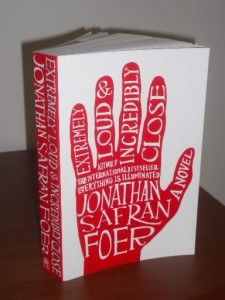 Of the two, it was much more difficult to write Sarah as a 9/11 survivor. This may have been an act of hubris. We create things that we hope will, someday, become objects of value. In the wake of the 9/11 attacks, many writers–Foer, DeLillo, and Roth, to name just a few–all came out with 9/11 novels. I was initially bothered by this. I wanted to say, “Fuck you; I was there.” This reaction is reflected in Sarah’s father in the book. This passed for a couple reasons. First was the realization that we’re all survivors of one type or another. Second, these texts can never really become authoritative positions on the experiences of a group of people, no matter how well written they are or how well credentialed their creators might be. William Styron couldn’t have produced a better work by being the grandchild of an African slave. There’s no uniform experience of being a 9/11 survivor, no uniform experience of being a woman. These are things that can’t be owned by anyone.
Of the two, it was much more difficult to write Sarah as a 9/11 survivor. This may have been an act of hubris. We create things that we hope will, someday, become objects of value. In the wake of the 9/11 attacks, many writers–Foer, DeLillo, and Roth, to name just a few–all came out with 9/11 novels. I was initially bothered by this. I wanted to say, “Fuck you; I was there.” This reaction is reflected in Sarah’s father in the book. This passed for a couple reasons. First was the realization that we’re all survivors of one type or another. Second, these texts can never really become authoritative positions on the experiences of a group of people, no matter how well written they are or how well credentialed their creators might be. William Styron couldn’t have produced a better work by being the grandchild of an African slave. There’s no uniform experience of being a 9/11 survivor, no uniform experience of being a woman. These are things that can’t be owned by anyone.
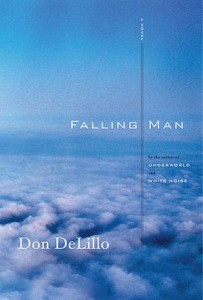 The more I think about it, the more I appreciate the architecture behind the narrative of Sarah/Sara. Without giving away anything important, I like that Sarah never leaves the Arctic.
The more I think about it, the more I appreciate the architecture behind the narrative of Sarah/Sara. Without giving away anything important, I like that Sarah never leaves the Arctic.
Right. In the story, Sarah never really gets out of the Arctic. Samuel Clemens said “all stories should end before the children get married.” The conclusion of Sarah’s spiritual journey is implied, but not given. Her redemptive act is to decide if the lights that she sees off in the distance are really her salvation, and her redemptive path is to destroy her father’s kayak and set off on her own. The moment of her redemption is also the moment where she separates herself from texts, marked in the novel by her abandonment of her journal, her decision to leave it behind. She frees herself from the sense that texts are controllable or monolithic.
The abandonment of her other physical possessions that precedes the leaving behind of her journal brought to mind the Oscar Wilde essay “The Soul of Man Under Socialism,” in which Wilde cautions his readers about constructing one’s identity with physical possessions. Would it be fair to read this abandonment as a realization, on Sarah’s part, that the myriad things that we surround ourselves with are, ultimately, meaningless, that in order to find real meaning we must discover it inside ourselves?
There is a secondary implication about such materialism in Sarah’s abandonment of the things she carries. She finds that the things she has are not sufficient sources of meaning. Sarah is always paring away things from her life. Even as she thinks about the future, and what pieces of furniture she’ll take from her deceased parents’ home, she is thinking about what she’ll leave behind. She trims every physical thing away from her life except an amulet that she plans to give to her imagined future love, Udi, yet that, too, is lost.
Was Sarah/Sara also a part of your own healing process, a part of your own search for meaning after 9/11?
I think the space of all cathartic writing is filled with the grappling with particular types of questions or problems. I always tell my students that writing is thinking, and that they can’t know what they’re thinking until they’ve actually written it down. Only after it’s written will they know what’s usable to them. The types of questions that I had about faith before 9/11 were dramatically different than what they were after.
Who are a couple writers who have inspired you?
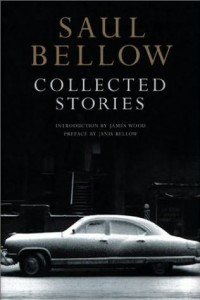
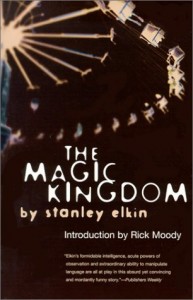
I really started reading Saul Bellow late in the game, but I can’t help but to feel that everything that I had written up to that point had also, somehow, been influenced by him. I really like Stanley Elkin.
What are you working on now?
I’m writing a Holocaust novel, which is something I never thought I’d do.
Jacob smiles, unguardedly, and we open a bottle of his home brew, dividing it into a couple glasses in silent, mutual agreement that something that you spend a great deal of time creating should never be quickly consumed. Two days afterward, Jacob would start an extensive reading tour, mostly by way of his bicycle, embarking on a journey of his own along the coast, then inward.
Further Links and Resources
- Jacob Paul’s website features more information about Sarah/Sara, details about his bicycle book tour, and information about his current writing projects.
- Read Contributing Editor Erika Dreifus’s review of Sarah/Sara for FWR.
- A short piece about Paul’s experience finding an agent and publishing Sarah/Sara is available online at Poets & Writers.





